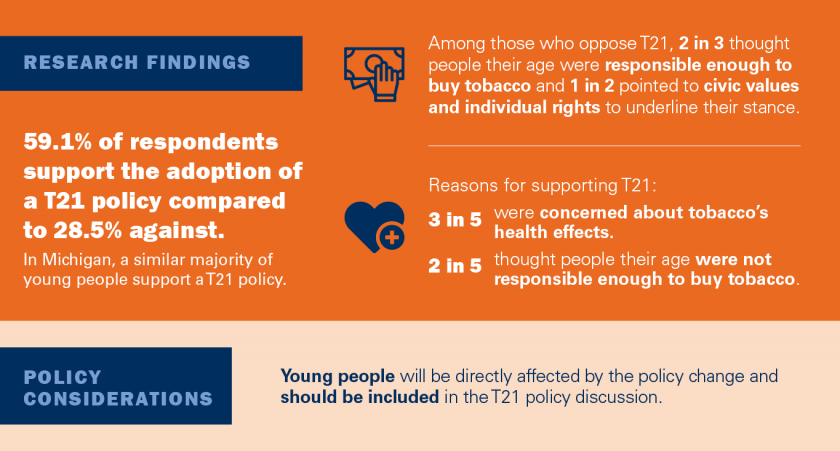More than 360 cities across the United States, as well as six states, have adopted Tobacco 21 legislation–which raises the minimum age to purchase tobacco products to age 21. Michigan is not yet among them, but that may change. A public health and policy team from the University of Michigan (U-M) analyzed the health and economic impact of enacting Tobacco 21 in the state, and their recommendations are based, in part, on the responses of MyVoicers in Michigan.
Tammy, MyVoice founder and adolescent health researcher, was among the members of the U-M Institute for Health Policy and Innovation that conducted the Tobacco 21 policy analysis. She noted, “The population most likely to be affected by Tobacco 21 policies are younger teens, whose input is largely missing in the debate. That’s where MyVoice comes in.”
MyVoice asked 800 youth from across the country to share their thoughts about increasing the minimum age for tobacco purchase. A majority of youth surveyed (59%) support the adoption of a Tobacco 21 policy, compared to 28% who were against. The research group’s Tobacco 21 white paper (available for free download) provides further nuance on the reasons youth support or oppose raising the minimum age. Youth who support Tobacco 21 were more likely to cite the negative health effects of tobacco, which those who opposed or were indifferent cited concerns about the efficacy of the legislations, with the widespread availability of tobacco and vape products.
Here is what we asked, in an open-ended text message survey in September 2018:
Hi! We want to know what you think about tobacco products like cigarettes, e-cigarettes, Juul, and hookah. Why do you think people your age use these products?
Do you think people your age should have the choice to use tobacco products? Why or why not?
Where do people your age get tobacco products?
At what age do you think people should be able to buy these products? Why?
Tammy adds, “Our work on Tobacco 21 is a perfect example of how MyVoice can engage youth in the policy decisions that impact their lives and their health.”
The research team also performed a comprehensive analysis of the potential effects of a statewide policy. They examined how smoking habits would change over the next 80 years if the legislation reduced smoking initiation by 10 percent. Over time, Tobacco 21 legislation could translate into 17,000 fewer smoking-related deaths and 198,000 fewer smokers by 2100. The team also examined existing implementation of the policy in Ohio to trace the components of a comprehensive public health plan.
You can read more about the work of the IHPI health policy group and download their white paper on Tobacco 21 in Michigan.

